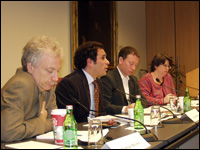{
"authors": [
"Amr Hamzawy",
"Nathan J. Brown",
"Marc Lynch"
],
"type": "event",
"centerAffiliationAll": "",
"centers": [
"Carnegie Endowment for International Peace"
],
"collections": [],
"englishNewsletterAll": "",
"nonEnglishNewsletterAll": "",
"primaryCenter": "Carnegie Endowment for International Peace",
"programAffiliation": "",
"programs": [
"Middle East"
],
"projects": [],
"regions": [
"North Africa",
"Egypt"
],
"topics": [
"Political Reform"
]
}
The Muslim Brotherhood's Party Platform
Wed, November 14th, 2007
Washington, D.C.
IMGXYZ814IMGZYXOn November 15, 2007, Amr Hamzawy and Nathan Brown from Carnegie, and Marc Lynch of George Washington University interpreted and analyzed the Muslim Brotherhood’s new party platform in Egypt.
Amr Hamzawy began by explaining the motivations, process, and internal tensions behind the ongoing draft of the platform. The platform comes at time when the Brotherhood has been on the defensive vis-à-vis the Egyptian government’s crackdown, and is a way of changing the headlines and clarifying their positions to the public. Contrary to the official narrative of the Guidance Bureau, the drafting of the platform was done without much consultation. This relatively closed process has brought out a division between the coterie supporting the Supreme Guide and the parliamentary bloc, who largely oppose two of the platform’s more controversial points: the elected juridical council of senior religious scholars and political limitations against Coptic Christians and women.
Next, Nathan Brown expanded upon and evaluated the rationale for issuing this platform, offering a comparative perspective with the case of the Islamic Constitutional Movement (ICM) in Kuwait. The political platform was intended to detail the Brotherhood’s policies at length to reassure international audiences and domestic critics, and to resolve internal differences, but this strategy has backfired. The media’s focus on the religious council, and discrimination against Copts and women has only painted the movement as regressive and forced them into a debate along unfavorable terms. In contrast, the ICM pursued a strategy of advocating material benefits for women to promote family values, rather than restricting rights.
Third, Marc Lynch discussed the online reactions to the drafting of the platform amongst the Brotherhood’s grassroots members. There is a third generation of Brothers agitating for a more active role in the movement, galvanized by experiences in student politics. Prominent young bloggers vehemently confronted the Brotherhood’s Guidance Bureau, questioning online the content and process of the platform. This is a continuation of younger members pushing back against the movement’s leadership, which sidelined them during the “Kafiya” protests. This activist segment, nonetheless, only makes up perhaps 15% of the younger generation.
In her discussion, Diane Singerman of American University asked if the Brothers were raising the stakes about their religious legitimacy as well as laying down bargaining chips in anticipation for the presidential succession. Questions from the audience included the topics of women in the movement, the actual impact of the bloggers, the popularity of shari’a, and the Brotherhood’s position on Israel.
Carnegie does not take institutional positions on public policy issues; the views represented herein are those of the author(s) and do not necessarily reflect the views of Carnegie, its staff, or its trustees.
Event Speakers
Amr Hamzawy is a senior fellow and the director of the Carnegie Middle East Program. His research and writings focus on governance in the Middle East and North Africa, social vulnerability, and the different roles of governments and civil societies in the region.
Nathan J. Brown, a professor of political science and international affairs at George Washington University, is a distinguished scholar and author of nine books on Arab politics and governance, as well as editor of five books.


